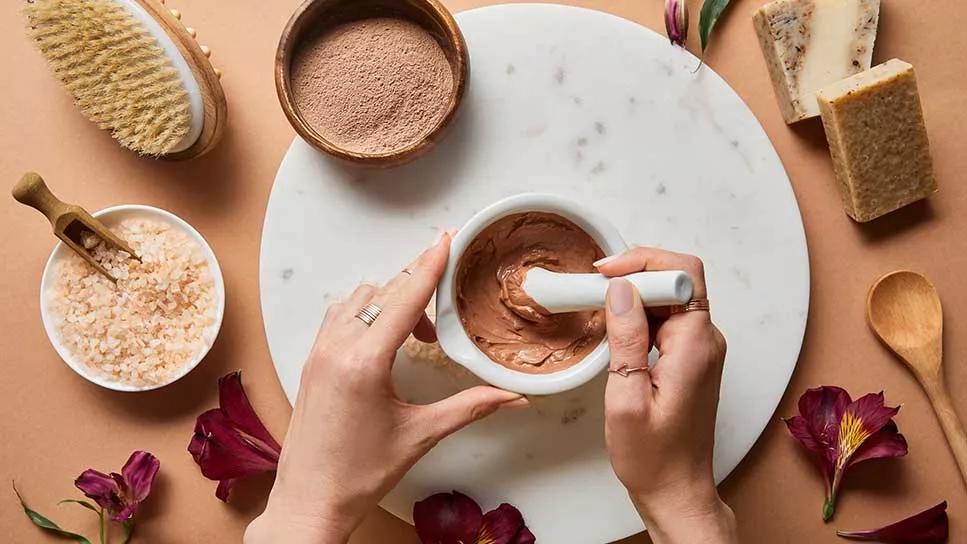Pure cocoa butter can help keep your skin supple, with a subtly delicious scent

Image content: This image is available to view online.
View image online (https://assets.clevelandclinic.org/transform/9de46c49-6a00-4172-9ffd-3b0da3e31848/Benefits-Cocoa-Butter-1163907662-967x544-1_jpg)
hands using mortal and pestle with cocoa powder, surrounded by soaps and bath salts
“Cocoa butter” sounds luscious, doesn’t it? And it actually is quite a treat — for both your taste buds and your skin.
Advertisement
Cleveland Clinic is a non-profit academic medical center. Advertising on our site helps support our mission. We do not endorse non-Cleveland Clinic products or services. Policy
“You can find cocoa butter in many skin products, and it gives chocolate its decadent creaminess,” says dermatologist Alok Vij, MD. “You can also buy pure cocoa butter on its own.”
But what exactly is this magical-sounding substance, and what makes it so good for your skin? Dr. Vij discusses what cocoa butter is, how to use it and the risks and benefits involved.
Cocoa butter comes from the beans of the cacao plant, which grows in hot, tropical areas. Processed cacao beans produce a fatty substance. After further heat treatment, it becomes cocoa butter. The rest of the bean becomes cocoa powder. Pure cocoa butter is solid at room temperature and smells mildly of chocolate.
Product manufacturers often use “cocoa butter” and “cacao butter” interchangeably, but some people argue they’re not quite the same. They claim that cacao butter is the true raw form of the butter while cocoa butter is a refined version.
Cacao gets processed at a low temperature, which is why some people consider it “unrefined.” But cocoa butter gets refined at a high temperature. While some people see them as distinct from each other, you can use them in the same ways, and they offer similar benefits.
Cocoa butter provides some excellent skin care benefits. According to Dr. Vij, cocoa butter may:
Advertisement
So now, you might be wondering, is cocoa butter a miracle cure for scars or stretch marks? Not quite.
“There’s no solid evidence that cocoa butter vanishes pregnancy stretch marks or reduces scars, unfortunately,” cautions Dr. Vij. If you’re looking for stretch mark treatment that’s more likely to work, skip the cocoa butter and talk to a dermatologist instead.
If cocoa butter is solid at room temperature, how do you use it on your skin? If you have a chunk of pure cocoa butter, you can rub it directly on dry areas. It will become creamy on your skin because it melts at body temperature. But that can get messy.
The easiest way to use cocoa butter on your skin and lips is to look for products that contain it. Drugstores, natural food markets and online stores are good places to find cocoa butter body creams and lip balms.
“Products including cocoa butter smooth on easily and feel less oily or tacky than pure cocoa butter,” says Dr. Vij.
Some skin products smell good enough to eat. That’s especially true if you’re using straight cocoa butter! But is it actually good enough to eat?
Yep! Cocoa butter is, in fact, edible. “Cocoa butter is in most chocolate products,” Dr. Vij explains. “It’s also an ingredient in some desserts.”
You can eat pure cocoa butter or use it in recipes. But while this sumptuous butter is delicious and (at least somewhat) nutritious, it’s also very high in calories. So, beware of overindulging. And definitely don’t eat your skin care products just because they say they have cocoa butter in them!
Dr. Vij notes that there are a couple of potential risks that come with using cocoa butter on your skin:
Advertisement
Those risks aside, cocoa butter is generally safe, both to eat and use on your skin. If you’re eating it, just be sure to buy cocoa butter that’s labeled safe for consumption. If you’re using it on your skin, Dr. Vij encourages you to do a spot test first, just to make sure you don’t have an allergic reaction.
If you don’t like the smell or feel of cocoa butter on your skin but want natural skin care, try African black soap or shea butter instead. Like cocoa butter, shea butter is in many skin care products. The two butters have similar moisturizing properties, but shea butter is odorless and softer at room temperature.
Advertisement

Sign up for our Health Essentials emails for expert guidance on nutrition, fitness, sleep, skin care and more.
Learn more about our editorial process.
Advertisement
Although it could be used as a moisturizer, this new trend is not recommended
It’s a great disinfectant for around your home, but not for your skin
Changes in texture, smell, color and performance are signs it’s time to throw the cosmetic item away
Strengthening your skin barrier, simple routines and minimizing products are ongoing, popular trends
Moisturizing, running a humidifier and adjusting your showers may help keep itchiness and irritation at bay
Glycolic acid benefits skin tone, texture and pigmentation by exfoliating dead skin
Some gentle soap and warm water go a long way when you’re washing these cosmetic tools regularly
New formulas are less drying and contain water-based and skin-loving ingredients
Although it could be used as a moisturizer, this new trend is not recommended
Communicating clear limits helps protect your time, energy and emotional well-being
High cholesterol can be genetic, but testing and treatment can lower your heart disease risk